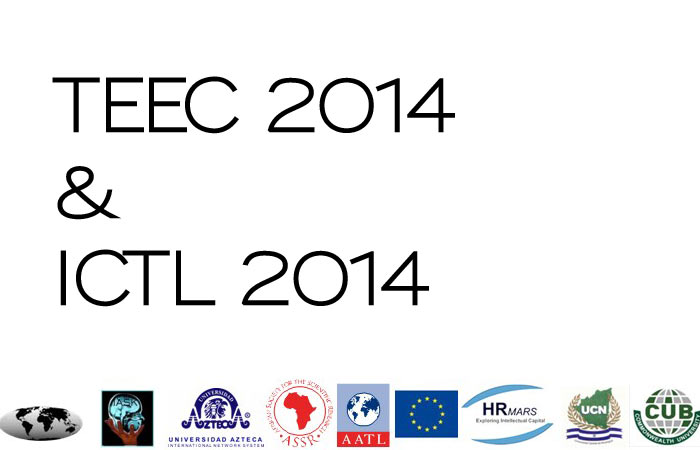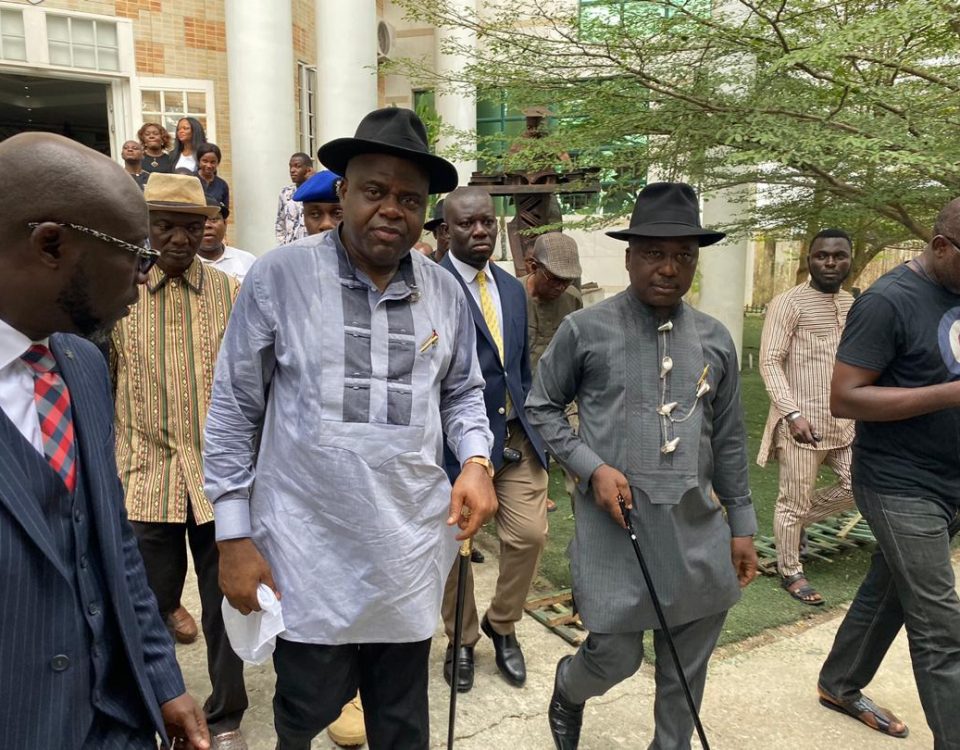
“NIGERIA BEYOND 2014 – PROSPECTS” INTERNATIONAL CONFERENCE – Call for paper
August 1, 2014
INTERNATIONAL CONFERENCE ON EDUCATIONAL TECHNOLOGY AND CURRICULUM STUDIES
August 2, 20144TH INTERNATIONAL TECHNOLOGY, EDUCATION AND ENVIRONMENT CONFERENCE (TEEC2014)
&
4TH INTERNATIONAL CONFERENCE ON TEACHING AND LEARNING (ICTL2014)
Venue : FCT Education Resource Center, Wuse, Abuja FCT-Nigeria
Date : 1-4 September, 2014
Theme and Topics
- Instructional Materials and Design
- Active Learning and Blended Instructions
- The Classroom and New Learning
- Distance Education
- Technologies, Strategies and Methods
- Software, Games and Simulations
- Vocational/Technical Education
- Educational Projects and Innovations
- Experiences in Learning
- Virtual Technologies
- Learning Objects and Technology
- Asynchronous Learning
- Content Management Systems
- Innovative Teaching Strategies
- Learning Management Systems
- Online Assessment
- Online Collaboration
- Online Forum Discussion
- Smart-Board Teaching
- Table of Specifications
- Virtual Classrooms
- Digital Libraries
- E-Learning Strategies
- Curriculum Design
- Advanced Technologies for TL
- Cloud computing
- Collaborative technologies
- E-publishing/digital libraries
- Learning management systems
- Learning portfolios
- Mobile teaching and learning technologies
- Shared online video
- Social networks
- Videoconferencing
- Web 2.0 (podcasting, wikis, blogs, etc.)
- Alternative & innovative assessment
- Assessment in cross-cultural research
- Best practices in assessment/evaluation
- Performance and outcome assessment
- Contextualized innovation
- Scalability, usability,& sustainability
- Education reform with technology
- Government initiatives and programs
- Technology Policy issues and trends
- Quality assurance and accreditation
- Teacher education & technology integration
- E-learning benchmarks and standards
- Evaluating for quality improvement
- Networks, Partnerships, and Exchanges
- Competencies and perspectives
- Courses, programs, degrees, and initiatives
- Learning barriers, challenges, and concerns
- Learning communities/Environments
- Learning partnerships and innovations
- Innovative Approaches to Learning
- Contextualized & real-world learning
- Case, Scenario & Project -based learning
- Collaborative learning
- Communities of practice
- Electronic Performance Support Systems
- Game-based learning
- Learner-centered, and self-directed learning
- Learning communities
- Learning management and support systems
- Lifelong, informal & nontraditional learning
- On-demand and just-in-time learning
- Participatory learning and media
- Personalized learning environment
- Virtual reality learning environments
- Free and open source software
- Learning portals
- Localization of content and knowledge
- Online language learning
- Open access publishing
- Open courses, learning, and open resources
- Publishing, copyright and other legal issues
- Open projects, partnerships, and consortia
- Open teaching
- Participatory/contributory communities
- Socially Responsive Learning
- Digital divide issues, initiatives, and cases
- Digital and social media for engaging youth
- Ethical, cultural, historical aspects
- social issues in technology use
- Education online films,
- Documentaries, news, & other media
- Learning technologies for change
- Rural community learning and technology
- Technology solutions for the marginalized
- Technology uses in multicultural contexts
- Flexible learning/Training
- Innovative online learning & programming
- Mobile and ubiquitous learning
- Online learning environments
- Mobile Communication Services
- Agents and Multi-Agents systems for ICT
- Antennas & Propagation
- Artificial Intelligence / Expert Systems
- Bioinformatics and Scientific Computing
- Environmental Technology
- Broadband & Intelligent Networks
- Business Information Systems
- Econometrics
- ICT Systems and Networks
- Complex Systems: Modeling
- Computational Intelligence Applications
- Computer Vision & Pattern Recognition
- Data Base Management
- Data Generation and Data Fusion
- Data Warehousing, Ontology &Databases
- Distributed Sensor Networks
- E-Commerce & E-Business
- Mining Technology
- E-Government & E-Working
- E-Health & Biomedical Applications
- E-Learning & E-Collaborations
- Emerging Technologies & Applications
- Ethical &Legal issues in Environment
- Evolutionary & Genetic Algorithms
- Fuzzy Logic & Systems
- Fuzzy, ANN & Expert Approaches
- Human-Computer Interaction
- ICT & Banking
- ICT & Education
- ICT & Intelligent Transportation
- ICT in Environmental Sciences
- Image & Multimedia Applications
- Image Analysis and Processing
- Information & Data Security
- Information Indexing & Retrieval
- Information Management Systems
- Information Processing
- Information systems & Applications
- Intelligent Computing Systems
- Internet Applications & Performances
- Knowledge Based Systems
- Time Management
- Knowledge Development
- Decision Making
- Machine Learning Technologies
- Machine Vision & Remote sensing
- Management Information Systems
- Geographical Information Systems
- Mobile Networks & Services
- Mobile/Wireless Computing
- Natural Language Processing
- Network Management and Services
- Networking Theory & Technologies
- Neural Networks Applications
- Next Generation Network
- Optical Communications
- Parallel and Distributed Computing
- Protocols and Standards
- QoS Management
- Real-Time and Embedded Systems
- Robotic Technologies
- Satellite & Space Communications
- Security and Cryptography
- Semantic Web Applications
- Signal & Image Processing
- Systems & Software Engineering
- Virtual workforces
- Web Engineering
- Wireless Communications
- Emerging Technologies in Education
- Engineering Education and Sustainability
- Innovation and Good Practice
- Learning and Teaching Methodology
- Media Production
- Computer Software in Engineering
- Mathematical and Statistical Applications
- e-Learning Tools and Developments
- Computer Science in engineering
- Web-based Learning
- Elect/Electronics Engineering Education
- E-Learning & Classroom Learning
- Mechanical Engineering Education
- Technologies of Virtual Education
- Chemical Engineering Education
- Environmental Dynamics
- Computer and Web-based Software
- Ethical Issues in Engineering Education
- Virtual Environments for Education
- University-Industry Collaboration
- Digital Classrooms
- Innovation in Engineering Education
- Multimedia in Engineering Education
- Current and Future Trends and Directions
- Historical Foundations and Heritages
- Philosophical Issues of Education
- Sociological Perspectives
- Psychological Aspects
- Political Dimensions
- Legal and Institutional Issues
- Education Practice: Issues and Experiences
- Economics/Management of Education
- Indigenous Education
- Internationalization and Globalization
- Adult Education/Life-Long Learning
- Instructional Materials and Design
- Active Learning and Blended Instructions
- The Classroom and New Learning
- Distance Education and Open Education
- E-Instruction, Virtual Education and Learning
- Technologies, Strategies and Methods
- Modeling, and Learning
- Organizational Learning
- Research and Development
- Online Systems and Forums
- Teacher Education
- Gender, Feminism and the Girl-Child
- Religious and Cultural Construction
- The School Principalship
- Teaching and Learning Projects
- Language, Mother Tongue and TL
- Quality, Testing and Assessment
- The Learning Society
- E-Society and Modernity
- Mathematics Education
- Studentship and Graduations
- Employment and Labour Dynamics
- Diversity, Barriers and Rights Issues
- Technology, Software and Games
- Pre-primary and Primary Education
- Intellectual Property and Copyrights
- Colonialism and Education
- Quality Assurance, Accreditation, Certification
- Vocational/Technical Education
- Physical Education and Sports
- Social Studies and Nationalism
- Business Education & Entrepreneurship
- Agricultural Education
- Music Education
- Fine and Applied Arts
- Home Economics/Management
- Health Education and Safety
- Population Education
- Teaching and Learning for Citizenship
- Military Education
- Architecture Education
- Science Teaching and Learning
- Cross-Cultural Studies in TL
- Educational Projects and Innovations
- Knowledge Management
- Higher Education
- The Private Sector and Education
- Education Networks/Cooperation
- Experiences/Experiments in Learning
- Secondary Education and Pre-University
- Remedial Programmes and Extra-Murals
- Engineering and Medical Education
- Legal Education and Human Rights
- Nomadic and Non Formal Education
- Education Policy Implementation
- Universal Basic Education
- Curriculum Planning and Implementation
- Monitoring and Evaluation
- Innovation and Change
- Environmental Education
- Literacy Campaigns
- Internet Technologies
- Human-Computer Interaction
- Human Resources and Capital
- Libraries and Information Studies
- E-Learning, M-Learning and U-Learning
- Parenting/Homeschooling and TL
- Administration and Organization of Education
- Virtual Technologies, Objects and Classrooms
- Links and Experience Between Institutions,
- Industries and Local Community
- Teaching Status and Motivation
- School Plant and Objects
- Contemporary Issues and Concerns
- Comparative Analysis and Experiences
- Learning Objects and Applications
- Prospects and Challenges of Education
- The Learner: Past, Present and Future
- Special Education/ Learning Disabilities
- Authoring and Publishing Technology
- Pedagogical Issues and Experiences
- Rural Education
- Academic Advising and Counselling
- Kinesiology and Leisure Science
- Reading and Writing
- Geographical Education
- Research Methodology
Submission of Papers
- The paper should be A4 format. Left, right, top and bottom margins should be 2.00 cm each.
- Title should be 14-point, all in capital letters, bold and centered.
- Font size throughout the paper should be 12-point in Garamond, in single space, and justified.
- The whole text should be written in English with “Garamond”.
- Do not give page numbers for the paper
- A blank line should be left after the title. Authors, affiliations and e-mails should be provided after title.
- Following the authors’ information, a 200-word abstract should be provided with five keywords. The “Abstract” should be a summary of the paper.
- The paper should be maximum 10 pages
- SI unit should be employed where applicable
- Only proposals containing abstract and full texts are acceptable. We do not welcome only abstracts.
- All submissions must be by email attachment preferably in MS words. We do not accept hard copies
- All papers must adhere to this template in format. No paper can be processed if not formatted according to the stated rules and regulations.
- Papers submitted after July 31, 2014 may be presented at the conference but they may not be published in the conference book
Conference Fees
Conference Fees
| Conference Registration: | International | Local |
| Registration: | US $250 | N35500 |
| Registration at Venue | US$300 | N45500 |
| Corporate Participation | US$350 | N55000 |
NB: Delegates resident in Nigeria can pay into the bank details below.
Name of Bank Account: Beverly Resources
Bank Account No: 1015407653
Name of Bank: United Bank for Africa PLC (UBA)
Subject: ICTL2014 & TEEC2014
Contact
For more information or clarification on any aspect of the Conference, please contact the secretariat,
Professor M. O. N. Obagah, Co-Chair, Tel: +2348033392236 Email: ictleditor@gmail.com or teecpapers@gmail.com



